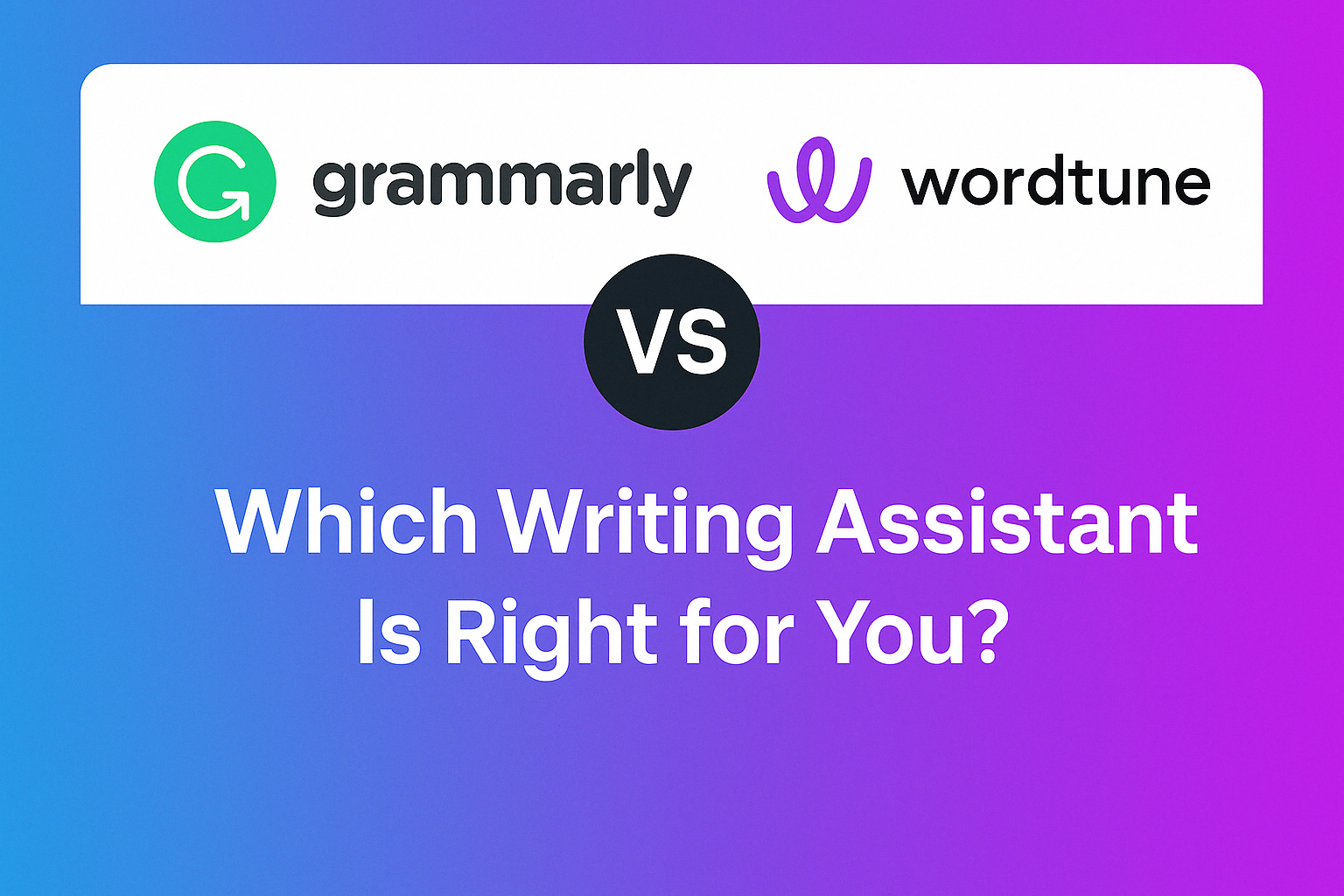Best AI Tools for Writers

Introduction: How AI is Reshaping the Writing Process
Writing has always been both a craft and a challenge. From the earliest days of pen and paper to today’s digital platforms, writers have grappled with the same obstacles—writer’s block, tight deadlines, endless revisions, and the pressure to constantly produce something fresh and compelling. Whether you’re penning your first novel, managing a personal blog, or ghostwriting for clients, the mental strain and time investment can often outweigh the joy of creativity.
Enter artificial intelligence. Once limited to science fiction, AI is now becoming one of the most transformative tools in the modern writer’s toolkit. With just a few prompts, these tools can help brainstorm topics, generate outlines, expand rough ideas into full paragraphs, or even mimic a specific writing tone. For authors, journalists, marketers, and content creators alike, AI is not a replacement—it’s an intelligent writing partner that speeds up the process while improving quality and originality.
More importantly, these tools are becoming more intuitive, more accessible, and more affordable. Writers no longer need to spend hours wrestling with a blank page or wondering how to rewrite a clunky sentence. With AI, the first draft becomes faster, the editing process more efficient, and the final output more polished than ever before.
In this in-depth guide, we’ll explore the best AI writing tools for writers in 2025. Each tool has been tested and selected based on usability, features, writing quality, and value for money. Whether you’re looking to speed up content production, break through creative blocks, or improve your grammar and tone, there’s a tool here for you. Let’s dive into how AI can help you write better, faster, and smarter.

Why Writers Should Use AI Tools
Writing isn’t just about putting words on a page—it’s about generating ideas, organizing thoughts, polishing tone, and revising drafts over and over again. This process is rewarding, but it can also be exhausting. For modern writers who are juggling multiple projects, facing strict deadlines, or simply struggling to get started, artificial intelligence can be a game-changer.
AI writing tools are designed to assist—not replace—the human voice. Their goal is to eliminate the friction between your ideas and the final product. Whether you’re a novelist trying to flesh out dialogue, a content marketer writing SEO articles, or a freelancer managing client briefs, AI can streamline your workflow at every stage. Here are several reasons why more and more writers are embracing AI as part of their creative toolkit:
- Beat Writer’s Block: AI can generate story prompts, topic ideas, and first drafts that get your creative engine running.
- Edit Faster: With tools like Grammarly, Wordtune, and Hemingway, you can fix grammar, improve tone, and enhance clarity in seconds.
- Write for Multiple Platforms: AI makes it easy to adapt your content for blogs, newsletters, social media, and more.
- Work in Multiple Languages: Need to reach a global audience? Many AI tools support translation and multilingual writing.
- Boost Productivity: AI speeds up content ideation, outline generation, and even headline suggestions—so you can publish more, with less stress.
Ultimately, AI is not about making your writing robotic. It’s about letting you focus on the parts that matter most—your message, your storytelling, your impact. With the right AI partner, you spend less time stuck and more time creating.

Top AI Tools for Writers
There’s no one-size-fits-all when it comes to AI writing tools. Depending on your niche, style, and workflow, the best tool for you might vary. Below are eight standout options that are trusted by professional writers, marketers, bloggers, and fiction authors alike.
Jasper
Jasper is one of the most versatile AI tools for content creators, especially marketers and long-form bloggers. It offers 100+ templates, tone customization, and deep SEO integrations with SurferSEO. If you’re writing blogs, emails, or landing pages, Jasper can help you move from draft to publish faster than ever.
- Great for marketers, bloggers, agencies
- Supports brand voice & SEO optimization
- Excellent user experience
Sudowrite
Sudowrite is built for creative writers—novelists, screenwriters, and storytellers. It helps you expand scenes, generate character descriptions, build plot twists, and overcome creative ruts. It’s designed more like a co-author than a template machine, making it a favorite for fiction-focused authors.
- Perfect for fiction writers and novelists
- Intuitive creative tools (Describe, Expand, Rewrite)
- Non-linear scene writing support
Grammarly
Grammarly is an essential editing tool powered by AI. It checks grammar, spelling, tone, clarity, and conciseness. Whether you’re polishing a business email or revising a blog post, Grammarly ensures that your writing is accurate and professionally styled. Its browser extension also works across most platforms.
- Best for all types of writers
- Real-time grammar, tone, and clarity checks
- Integrates with Gmail, Docs, Word, etc.
Notion AI
Notion AI is ideal for writers who already use Notion to organize their research, notes, and outlines. It can generate summaries, rewrite paragraphs, answer questions, and even draft blog posts directly within your Notion workspace. It’s a seamless blend of productivity and intelligence.
- Ideal for note-based writers & content teams
- Write & brainstorm directly in your workflow
- Affordable and integrated with Notion app
Copy.ai
Copy.ai is perfect for short-form content like product descriptions, email subject lines, and social media posts. It provides more than 90 ready-made templates and a simple UI that helps writers generate copy in just a few clicks. It’s an excellent option for freelance marketers and ecommerce writers.
- Great for product copy, emails, ads
- Beginner-friendly interface
- Offers a solid free plan
Scalenut
Scalenut is a powerful tool for SEO writers and bloggers. It combines AI content generation with keyword research and SERP analysis. The Cruise Mode lets you generate entire SEO-optimized blog posts in one workflow. If search visibility matters to your writing, this tool is a top contender.
- Perfect for content marketers and SEO writers
- Keyword clustering + topic research
- Long-form blog automation
WordHero
WordHero is an affordable, all-in-one AI tool with unlimited word generation. It’s best for solo creators who need quick content for various formats—blogs, emails, product copy, social captions, and more. It’s known for offering one of the best lifetime deals in the AI writing space.
- Ideal for freelancers, solo bloggers, startups
- Simple interface with 70+ templates
- Unlimited usage on lifetime plan
ChatGPT
ChatGPT by OpenAI is one of the most flexible AI writing companions. Whether you’re looking to brainstorm ideas, generate long-form drafts, rewrite existing content, or chat through creative blocks, ChatGPT can do it all. Its conversational interface allows for real-time collaboration that feels natural and fluid.
- Excellent for ideation, rewriting, Q&A
- Supports long-form storytelling and technical writing
- Available free with upgrades for more power
How Writers Use AI in Their Daily Workflow
While AI tools are powerful on their own, their true value shines when they’re embedded directly into a writer’s workflow. From ideation to editing, AI can assist at every stage, making writing faster, more organized, and less mentally draining.
Below is a breakdown of how professional writers integrate AI tools into their daily process:
1. Brainstorming & Outlining
Writers often begin with a blank page and a foggy idea. Tools like ChatGPT or Jasper can quickly turn a vague topic into a detailed outline, generate potential blog titles, or suggest plot directions for fiction authors. With just a few prompts, these tools generate dozens of relevant ideas that would otherwise take hours to develop.
2. Drafting & Expansion
Once the structure is clear, AI can help fill in the blanks. Jasper and Copy.ai can expand bullet points into paragraphs. Sudowrite excels at rewriting or lengthening creative scenes. For nonfiction writers, Scalenut can auto-generate full sections using target keywords and research data.
3. Real-Time Rewriting
Midway through a project, writers often hit a wall. AI can step in to rephrase awkward lines, shift tone from casual to formal, or simplify complex explanations. WordHero and Notion AI are great for refining content live as you write.
4. Editing, Proofreading, and Polishing
AI editing tools like Grammarly ensure your final draft is clean, correct, and audience-appropriate. Grammarly doesn’t just check grammar—it also provides tone suggestions and clarity improvements. Hemingway is another great option for trimming verbose passages.
In short, AI turns writing from a linear, labor-intensive chore into a multi-step, collaborative process. Writers don’t have to go it alone anymore—they can move between planning, writing, and revising with support at every click.

Best AI Tool Pairings for Writers
While each AI tool has its strengths, the best results often come from using them in combination. Strategic pairings allow writers to cover the entire writing lifecycle—from concept to publication—with greater precision and less manual effort.
Jasper + Grammarly
Jasper is excellent for content creation, while Grammarly ensures it’s polished to perfection. Use Jasper to generate blog drafts, emails, or product descriptions, then run them through Grammarly for grammar checks, tone alignment, and overall clarity.
Sudowrite + Notion AI
This duo is ideal for fiction writers and storytellers. Sudowrite helps with scene expansion and emotional tone, while Notion AI organizes ideas, character notes, and timelines in a flexible workspace. Together, they support both creative flow and structural discipline.
ChatGPT + Copy.ai
ChatGPT is great for brainstorming, outlining, and Q&A-style content. Pairing it with Copy.ai lets you take those ideas and generate compelling short-form copy for social media, product launches, or email subject lines—fast.
When used together, these tools allow you to move seamlessly between phases of writing without feeling like you’re starting over. Instead of relying on one app for everything, choose the ones that complement each other and match your style.

Common Mistakes Writers Make When Using AI
While AI writing tools offer immense power and convenience, they’re not magic bullets. Many writers fall into the trap of over-relying on these tools or using them improperly—often to the detriment of their content. Understanding what not to do is just as important as knowing what to do.
- 1. Publishing AI-Generated Content Without Editing: AI can draft quickly, but its output often lacks nuance. Skipping the editing phase can result in robotic tone, factual errors, or shallow insights.
- 2. Using Vague or Poor Prompts: Garbage in, garbage out. Vague prompts yield generic results. Be specific in your instructions—tell the AI the style, length, purpose, and audience.
- 3. Ignoring Voice and Authenticity: AI doesn’t know you. If you rely too heavily on it, you risk losing your voice. Always add your perspective, personality, and editing to make it sound like you.
- 4. Treating AI as an Answer Machine: AI is a tool, not a fact checker. Don’t assume its suggestions are accurate or trustworthy. Especially in journalism, research, and opinion writing, always verify sources independently.
AI should enhance your writing, not replace your judgment. Think of it as your assistant—not your ghostwriter.

Expert Advice: What Writers Really Think About AI
As AI continues to shape the future of writing, many professionals in the field have shared nuanced, thoughtful opinions—not just about how to use AI, but why. Below are insights from experienced writers who have successfully integrated AI into their workflows without compromising on creativity or authenticity.
“I use AI to get through rough patches in my manuscript. It’s like brainstorming with a friend who’s never tired. But I never copy and paste. The final story is always mine.”
“AI helps me organize my ideas quickly, but I never let it speak for me. Tools like Notion AI are great for drafts, but my edits give it a human touch.”
“Think of AI as a writing partner. It’s smart and fast, but it doesn’t know your voice unless you teach it.”
The key takeaway? Use AI for speed, structure, and support—but never forget that your voice, insight, and perspective are what readers come for.
Frequently Asked Questions (FAQ)
1. Can AI replace human writers?
No. AI can assist in drafting, editing, and idea generation, but it lacks human context, emotion, and personal insight. The best writing comes from a blend of AI support and human creativity.
2. What’s the best AI tool for novelists?
Sudowrite is specifically designed for fiction writers. Its features include scene expansion, character development tools, and tone-specific suggestions to help you move your story forward.
3. Are AI writing tools safe to use for academic or professional work?
Yes—with care. You should always verify facts, sources, and citations. Tools like Grammarly or Notion AI are great for editing or summarizing, but shouldn’t be solely relied on for academic research integrity.
4. Can I use AI to write in other languages?
Absolutely. Tools like ChatGPT and Jasper support multilingual prompts and outputs, making them suitable for global communication and international writing tasks.
5. Do AI tools plagiarize content?
No, they generate original text, but it’s still your responsibility to check for unintentional overlaps, especially when writing on common or well-covered topics.
Conclusion: Let AI Empower Your Writing Journey
Writing is no longer a lonely, uphill battle. With the right AI tools by your side, you can write faster, cleaner, and with more confidence—without sacrificing your unique voice. From sparking ideas to editing final drafts, AI is helping writers across the world break through creative barriers and level up their output.
Remember, AI isn’t here to take over your job. It’s here to make your job easier. It’s a digital partner that works at the speed of thought, ready to help whenever you need support. Whether you’re drafting fiction, writing blog content, or publishing client copy, there’s an AI solution tailored to your needs.
Explore the tools above. Try a few. Combine them. Refine your workflow. Because the future of writing isn’t man vs machine—it’s man + machine.
More Reading for Writers
Explore related guides and comparisons to deepen your understanding of AI-powered writing:



